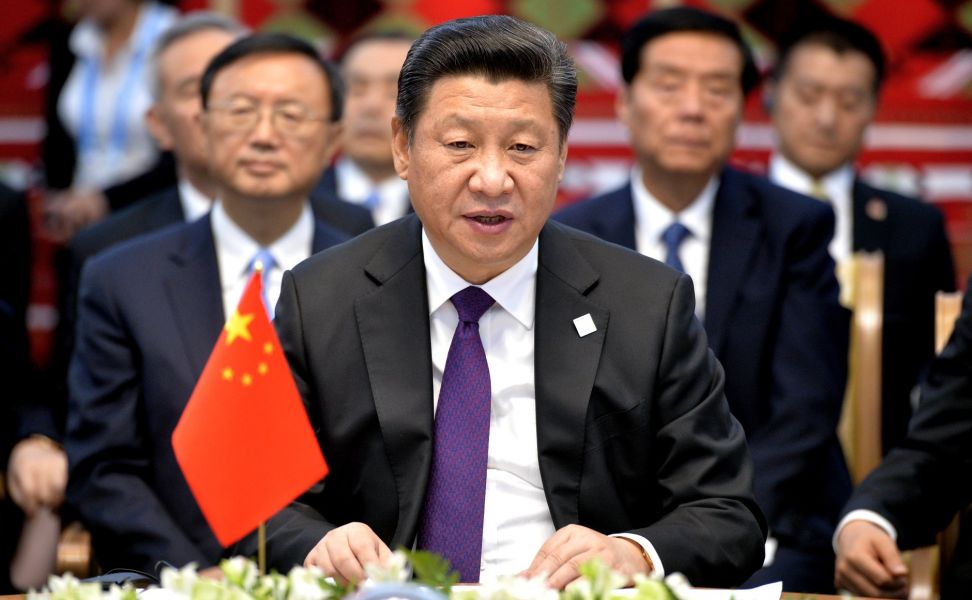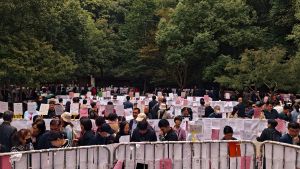
Xi Jinping’s Third Road: A Response
I rarely disagree with my friend and colleague, the always insightful Ling Li, but I cannot go along with her most recent analysis of Party leadership and the succession issue (Li 2021). She suggests that Xi Jinping may reactivate the office of Chairman of the Party Central Committee at the twentieth Party Congress in 2022. It is of course possible that he may do so, but I am not convinced by the particular reasons she offers.
First, she argues that the office of Party Chairman is the only Party office that is not bound by the principle of collective decision-making. I do not understand this claim. Party leaders, whatever office they hold or do not hold, are or are not bound by the principle of collective decision-making depending on their individual clout, which in turn stems from numerous factors. One simply cannot say that Xi as General Secretary is currently bound by collective decision-making, whereas if he could only get himself named Party Chairman he would not be.
Second, she argues that being Party Chairman would allow Xi to continue to rule and to micromanage the succession process at the same time. On the first point, she notes that there is no term limit on the Party chairmanship. This is true, but by the same token there is no term limit on his current position as General Secretary, either. She refers to unwritten conventions, presumably implying that there is an unwritten convention that the General Secretary should not serve more than two five-year terms. But if that is the argument, it could equally be said that there is an unwritten convention that there should be no Party Chairman at all. After all, the Party Chairmanship was abolished in 1982, well before the establishment of any unwritten two-term norm. Thus, the unwritten convention of no Party Chairman is, if anything, even older and more established than the unwritten convention of two five-year terms.
On the second point, she suggests two possibilities: that the now-vacant General Secretary position could be allotted to the heir-designate for grooming, or it could be revoked so that a few candidates could compete within the Politburo Standing Committee.
I do not see how these possibilities are different from what is already available and would therefore require Xi to reactivate and then take the position of Party Chairman. As the cases of Hu Jintao and then Xi himself show, it is entirely possible to name and groom a designated heir within the current system, where the leader holds the position of General Secretary and the heir holds some other position.
Indeed, if Xi elects the other option Li proposes—abolition of the office of General Secretary—then we would be exactly where we are today: the Party leader in the top Party position and one or more potential successors in lesser positions. It is unnecessary to create and occupy the position of Party Chairman to accomplish this.
In short, I just do not see how ‘[t]he reactivation of the office of Party Chairman would … provide a convenient structure that allows the incumbent leader to control the succession process and accommodate trial and error’ in a way that the current system does not.
Finally, I have to disagree with the characterisation of Xi as an ‘exceptionally shrewd political ruler who projects the future in centenary terms’. Xi is obviously a skilled politician within the Chinese system, but I see no evidence that he is of more than average intelligence or shrewdness in any other respect. Both China’s internal problems and its foreign relations have gotten worse, not better, under Xi. And a man who is projecting the future in centenary terms does not send a mere foreign minister to an important climate summit.
Moreover, the fact that he has not dealt with succession in no way implies the unlikely conclusion that it must have slipped his mind, thereby justifying Ling’s supposition that he must be planning for it after all. History is replete with authoritarian rulers who did not plan adequately for succession—not because it slipped their mind, but for the very good reason that they believed it would undermine their position before they were ready to go. After Lin Biao, who did Mao plan to have as his successor? Who did Stalin have? Who did Hitler have? The list goes on and on. It would be entirely rational and utterly unsurprising for Xi to intentionally fail to provide for a clear succession.
None of this is to deny the possibility that Xi will resurrect and then take the position of Party Chairman. But I cannot see that the motivation would be that of providing for the succession. More plausible to me is that he would wish to continue, for both practical and egotistical reasons, his self-canonisation as the direct successor to Mao (just look at the People’s Daily these days), and taking the position made famous by Mao is the obvious next step.
Ling Li’s Response:
Don’s argument raises two issues: a) differences between the offices of the Party Chairman and the Party General Secretary (PGS); and b) differences, or rather, connections between formal and informal powers.
About the first issue, there is a qualitative difference between the office of Party Chairman and the office of PGS: the power of the PGS is derived from its membership in a collective decision-making body, the Politburo Standing Committee (PSC). The Party Charter does not allocate any specific decision-making power, let alone veto power, to the PGS. The PGS is one member of the collective body of the PSC, who takes charge to ‘convene and chair’ the PSC and the Politburo meetings, and to ‘supervise the work of the Central Secretariat’. Granted, all these powers are in no ways insignificant, and they provide the PGS with the necessary tools to manoeuvre these meetings and their outcomes. But this is different from the office of the Party Chairman—at least as Mao Zedong held it—where one is, by decree of the Party Charter, to sit above the Central Committee, the Politburo, and the PSC.
About the second issue that Don raises, the informal power or ‘individual clout’ in his words does not function in isolation from formal power. For instance, Mao did not and could not make many waves in his earlier political career when he was not given top offices in the Party Centre, where formal power resided. Similarly, Xi Jinping could not have accumulated the amount of power or ‘clout’ he has now before he took the PGS office in 2012.
Regarding Don’s point that there is no term limit for either of the two positions—Party Chairman and PGS—and hence the former is no more attractive than the latter, I agree. However, this does not represent the entirety of my analysis. I raised this point to show that the term-limit issue does not make the Party chairmanship less attractive than the position of PGS. And the comparative attractiveness of the Party chairmanship is addressed in my second point of that section, where I explain that the position would allow Xi to achieve two goals simultaneously, as well as in my response to the first issue that Don raised above.
Don argues that the possibilities that I outline are the same as what is already available to Xi. I beg to differ. At the risk of oversimplifying, the difference is akin to that between the captain of a soccer team and the referee. The elevation will separate the Chairman from the ‘players’ in status but does not separate him from the game. Currently, as the PGS, Xi Jinping is merely the leader of one faction, albeit the dominant one, despite all the power that he has accumulated and consolidated over the past decade. If he is elevated to the Party chairmanship, however, he can become the arbiter of all factions, as Chairman Mao was, a widely shared assessment by scholars of Party history.
On the matter of Xi Jinping’s political shrewdness, I would say that to navigate the high-risk and high-gain multi-dimensional power plays in an opaque environment requires a different skill set. It is not surprising at all that people can excel in some matters but not in others. I know people around me who can speak five languages but could not manage to call an Uber with a mobile phone.
Finally, regarding the last point raised in Don’s response, I am glad that Don actually agrees with me that Xi Jinping is in possession of the required cognitive capacity to understand the importance of the issue of succession and that the reactivation of Party Chairman is a possible choice. Even on the issue of Xi’s motivations, Don and I are actually not as far apart as it seems. Don argues that it is ‘plausible’ that Xi might take the chairmanship for ‘practical and egoistical reasons’. First, I share his view that the psychological conditions and the emotional state of an individual or a group play no small part in dynamic high-stake power games. Secondly, the arguments that I have advanced in my op-ed are in fact an attempt to unpack what Don calls the ‘practical’ reasons. Instead of lumping everything under a popularised label, I tried to provide a rational analysis of what makes a particular choice ‘practical’.
On this note, it seems only appropriate to conclude my response to Don’s helpful critique by clarifying the purpose of my op-ed. It is not to render a foresight that he will or has chosen ‘the third road’, or that he can actually pull it off if he does. Rather, I am arguing that if he is thinking what I think he is thinking, and can overcome all the obstacles to pull it off, it seems to me, with all the information that is publicly available, that the reactivation of the Party Chairman office is the best path for him to take in 2022.
References
Li, Ling. 2021. ‘The Third Road: Where Will Xi Jinping Go in 2022.’ Made in China Journal, 1 November. madeinchinajournal.com/2021/11/01/the-third-road-where-will-xi-jinping-go-in-2022.





